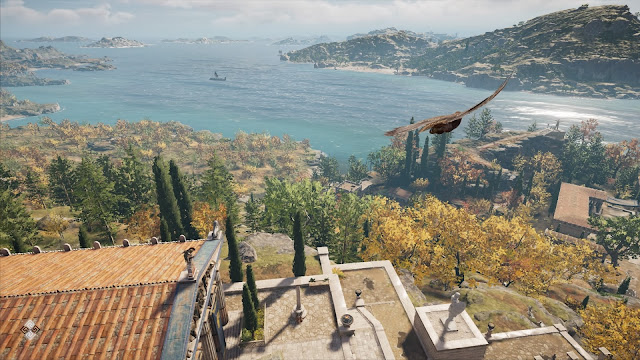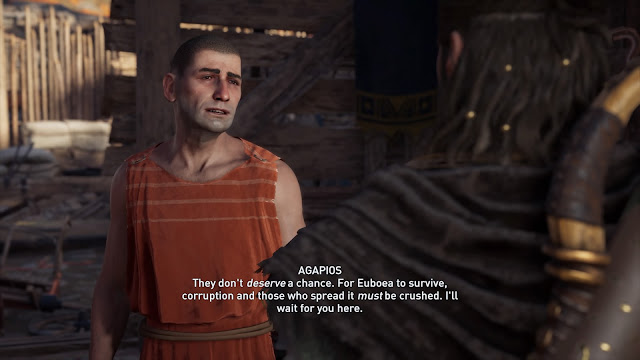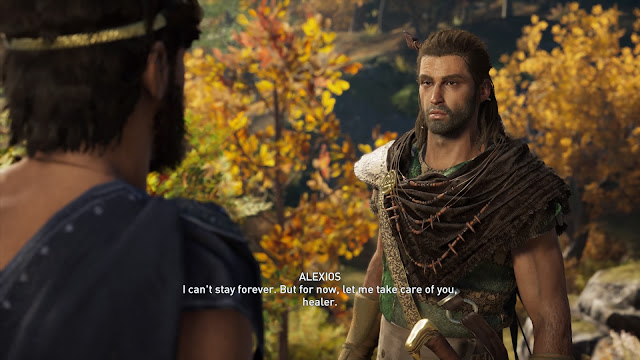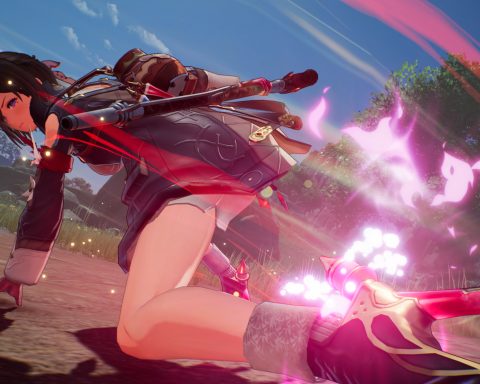Review by Ginny W.
The sunlight is almost blinding as it glints off the rolling hills of Phokis. My horse, Phobos, has somehow survived a bloodless goring by a bus-sized boar who charged right at us while we were enjoying a leisurely canter across a plateau. Unfortunately, he’s nothing like his namesake, because as soon as his legs fold under him he darts off and leaves me staring right down the barrel of the Kalydonian Boar. I roll out of the way just in time as giant tusks slam into the area where my feet were moments ago and as I escape a mortal wounding, time seems to slow. Flames lick their way down my twin blades and I score the beast across its flanks once, twice, and then a third time before the flow of time snaps back into place and the wounded animal roars angrily.
We’re locked in combat, tusks against steel, as day turns into night and then into day once more. As the sun comes up, I finally skewer the pig between its eyes and take a moment to catch my breath before looting its body, the bodies of all of its children, and magically teleporting myself to the top of a statue of Artemis a few hundred meters away. The quest-giver accepts the skin of the boar I just killed, we flirt until she alludes us having to an orgy with other the Daughters of Artemis, and I walk away with 3,300 EXP and more drachmae than anyone in the region would realistically see as part of a month’s work. This is Assassin’s Creed: Odyssey – a brash, tongue-in-cheek romp through a world that looks like Ancient Greece, schemes like Ancient Greece, but is most assuredly not a Greece that our historians would recognise.
Assassin’s Creed Odyssey sells itself as a tour of Ancient Greece and as a Pick Your Own Adventure game. You play as either Alexios or Cassandra, mercenaries with a tragic family past steeped in betrayal, political intrigue, and almost comical doses of misunderstanding. It’s really the perfect vehicle for a classic Euripidean tragedy; Odyssey in particular clearly revolves around a heroic figure who is humanised by moral failings. Firstly, you’re thrown into a prologue explaining your character’s backstory, replete with godly wrath and family honour. Secondly, there is the parados, where the game’s narrative unfolds in its usual episodic way to chart the journey of the tragic hero. Thirdly, there are the stasima – these take the form of cutaways to the modern times and Abstergo’s concerns with the Animus, allowing us comment on events that we witnessed in the parados. Last but not least, everything overwhelmingly goes to custard.
The game goes to great lengths to tie itself to the world that we know now by offering up geographical tidbits on every ancient landmark that you can shake a stick at, ranging from an unusually deep natural pool to a sheep hut on the ranges. Googling any of those locations nowadays would net you a link to a list of Greek’s most scenic environments, and it’s admirable that the team at Ubisoft has tried to make the world of Odyssey contemporaneously exciting. If you take a screenshot of a beautiful moment at a landmark, others will be able to view that screenshot as well and to share in the glory with you. Think Instagram, but courtesy of Abstergo, and perhaps more functional, if it weren’t adding dozens more icons to clutter up the already heaving map.
It’s those icons that really make your odyssey seem less like Homer’s Odyssey and more like a walking tour. That isn’t necessarily a bad thing if your only objective is sightseeing, but it does go some way in removing you from the tragic story that it tries very hard to make you care about. Things like fast travel options and collectible icons being strewn across the map like leaves in the wind are not new to the Assassin’s Creed franchise by any means, but charting your legendary course across the Aegean feels a lot less cool when you’re inadvertently distracted by the compulsive need to dock your gigantic warship every kilometre or so for the sole purpose of climbing a giant tree so that your bird gets better at telling you where guards might be.
This isn’t a matter of looking a gift eagle in the mouth, but more a critique about scene-setting and immersiveness. Assassin’s Creed Odyssey drops you into the middle of an incredibly well-crafted and reactive world, so to have to spend any time out of it or to do things that make you forget about all that environmental storytelling seems like a mistake. The gigantic numbers popping up next to enemies when you deal damage to them has much the same effect. The health bars are one thing – those are visually helpful enough without needing the addition of glowing figures in the triple digits that tell you what you already know, “Yes, Alexios, you’re really showing them who’s boss.”
The game leans heavily into you having otherworldly (read: genetically superior) qualities to the rest of the peasants around you that include leaping across a clearing and disemboweling two people in under ten seconds. The Athenians and Spartans that you meet think that your physical gifts are a result of being blessed by the gods. Skill trees function as a necessary evil to quantify and to explain this phenomenon to players, but the focus on effectiveness percentages on top of that don’t add clarity so much as erode the mysticism that those around you attribute to your powers. Being known as the famed bearer of 6 per cent Assassin Damage Daggers and Stealth-Attacker of 1,417 Hit Points doesn’t really roll of the tongue as nicely as Alexios the Son of Lightning and the Chosen of the Hunt.
That being said, pretty much every other aspect of Assassin’s Creed Odyssey has tried to put its best foot forward. Combat is lively and engaging, even though things like arrows sticking into enemies and persisting over time can rob certain deadly fights of their gravitas. You’re given a range of out-of-this-world abilities mimicking the likes of 300 (that film) and any number of Angelina Jolie assassin films, where everything slows time for maximum violent gratification, all the time. You have the opportunity to feel incredibly deadly, and finally clicking with the game’s dodge and parry mechanics makes for a fluid and empowering experience.
However, your prowess can feel a little undeserved when the enemy AI hits its head and decides to take a drunken toddler’s approach to strategy and spatial awareness. While the vast majority of your foes in Assassin’s Creed Odyssey will push you to your limits by virtue of combat strength or having unexpectedly gigantic hitboxes, the assassination part of Assassin’s Creed just doesn’t have the same bite to it.
Simply put, it’s easy as hiding in a piece of grass the size of your gluteus maximus, whistling at a nearby misthios to distract them, and shanking them in the neck. You can repeat this process as many times as you like without breaking your stealth kill bonus even as the corpses of your dead foes start taking up more space than the shrub that you’re hiding in. When you’re finally discovered because all that crouching is hurting your quads, the two foes you haven’t killed are easy pickings without any reinforcements. Fighting out in the open is a near faultless experience, but you would think that the stealth sections would be a little comprehensive given the nature of assassinations and, well, the name of the game.
Enemy intelligence aside, the world of Assassin’s Creed Odyssey is larger than life and equal parts dramatic and comedic. It has a host of NPCs that provide daily quests ranging from delivering sums of money to wayward children, to spending three days with an older woman because her husband is having performance issues. A flirty encounter in a field can turn into an epic tale of pursuing a cursed old prophet complicit in war-time deaths as you uncover more about your new beau. The world changes as you change; kill enough Spartans and you destabilise the region for the Athenians (and vice versa) which opens up open warfare sections mimicking the territorial land grabs that were taking place in Boetia and Megaris at the time. Just don’t think too hard about how you can flip allegiances at the drop of a hat with absolutely no consequences whatsoever. Or about your deep, dark family secret that involves aliens.
While the game isn’t necessarily historically accurate, that’s not something which grates as much as players might expect. The world is a mish-mash of Greco-Roman influences that doesn’t hold itself out as being authentic in any way to the works of Herodotus, which a lot of modern historians see as a starting point for exploring Ancient Hellenic matters. Just like The Romance of the Three Kingdoms, Herodotus’ work contains so many larger than life conflicts and otherworldly explanations that it occupies a place that a lot more like historical fiction than fact. It’s not quite accurate to call it a return to form for the series, because the very fabric of the world that it inhabits straddles that same line between imagination and reality. However, it is an incredibly entertaining tapestry of its own, rich with the labours of heroes, and a distinctly modern flair.
It’s the spirit of these works that Assassin’s Creed Odyssey eagerly mimics, with Spartans throwing shields willy-nilly, an irreverent disregard for naming conventions, and moments that wouldn’t feel out of place in Thor: Ragnarok. Its focus on the dust and dirt of mercenary life in Greece instead of the clinical chairs of Abstergo is highly rewarding, and it manages to encourage interest in the rich history of the world without needing to lecture. It’s not a game about ancient history so much as a game about the tragedies, epics, and comedies that make up the bulk of what know about life during that those days. Like the Iliad, Dionysus, Lysistrata and other great works of art, your feats in Assassin’s Creed Odyssey are incredulous in the best way possible, and it’s honestly more entertaining for it.
– Ginny W.
Contributor












